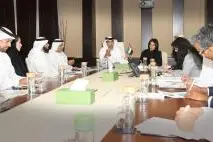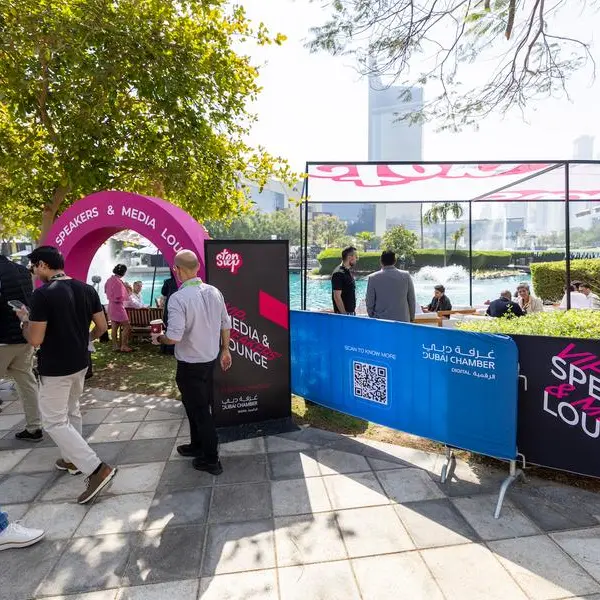PHOTO
Ecological Footprint Initiative Steering Committee approves the development of a UAE Vehicle Fuel Economy standard, led by the Emirates Authority for Standardisation and Metrology (ESMA).
The standard will play a key role in helping the UAE achieve its emission reduction targets and support the country's sustainability agenda in line with UAE Vision 2021.
H.E. Razan Al Mubarak: UAE has positioned itself as a leader in sustainable development and EFI has been fundamental in providing focus and expertise.
Abu Dhabi, UAE – 27 September 2016
H.E. Dr. Thani Al Zeyoudi, Minister of Climate Change and Environment [1] and, Chairman of the Ecological Footprint Initiative Steering Committee, renewed UAE’s commitment to lower the country’s carbon emissions under the aegis of the Ecological Footprint Initiative (EFI) [2]. The announcement was made at yesterday’s steering committee meeting of the EFI, which was chaired by H.E. Dr. Thani Al Zeyoudi, and attended by H.E. Razan Al Mubarak, Secretary General of the Environment Agency – Abu Dhabi [3], Co-Chair and Sponsor of the EFI.
The development of the Vehicle Fuel Economy standard, led by ESMA [4] will ensure fuel efficient cars are available to UAE drivers. The standard is set to play a key role in helping the UAE achieve its emission reduction targets and support the country’s sustainability agenda in line with UAE Vision 2021.
When adopted by the UAE Cabinet, the proposed standard has the potential to deliver annual fuel savings to UAE households worth 9.5 billion AED – representing carbon savings equivalent to removing 4.5 million cars from the UAE’s roads by 2035 [5].
The initiative brings together high-level stakeholders from a wide range of federal and local entities working in the domains of transport, environment, water and energy. At yesterday’s meeting, H.E. Dr. Thani Al Zeyoudi congratulated EFI partners for their commitment to reducing both UAE’s carbon emissions and contribution to climate change.
Commenting on the importance of the initiative, H.E. Dr. Thani Al Zeyoudi, Minister of Climate Change and Environment and, Chairman of the Ecological Footprint Initiative steering committee said: “Since its creation in 2007, the EFI has supported the UAE’s progress towards a low-carbon, climate-resilient future by developing innovative, science-based policies to reduce carbon emissions. This collaboration on improving vehicle fuel economy adds to the EFI’s impressive track record and is a firm indication of the UAE’s commitment to stronger action on climate change, in line with the UAE’s recent ratification of the Paris Agreement.”
H.E. Razan Al Mubarak, Secretary General of the Environment Agency – Abu Dhabi and Co-Chair and sponsor of the Ecological Footprint Initiative, commented: “The UAE has positioned itself as a leader in sustainable development and the work of the EFI has been fundamental in providing focus and expertise, in particular in our efforts to reduce the UAE’s contribution to climate change. In the past the EFI has undertaken a robust verification of the data behind the UAE’s ecological footprint. Since then, it has convened a number of key stakeholders who are all committed to reducing our ecological footprint. Previous successful initiatives include the introduction of the UAE’s lighting standard. The latest initiative by EFI is to implement the Vehicle Fuel Economy standard, this is a significant step to help make the country’s vehicle fleet more fuel efficient, addressing one of the country’s main sources of greenhouse gas emissions and supporting the transition to a low-carbon economy”.
The new standard, based on Corporate Average Fuel Economy (CAFE) standards in the United States, would also ensure that the country receives the most advanced vehicle technologies and profits from associated economic benefits.
Explaining the objective of the standard, Abdullah Al Maeeni, Director General, Emirates Authority for Standardization and Metrology (ESMA), commented: “The standard is designed to bring more efficient vehicles to the UAE. It will also build on regional initiatives such as the new GCC-wide car labelling system for light-duty vehicles which enables consumers to make informed decisions. According to our research, consumers will recover any additional costs of buying more fuel-efficient cars within one to four years and will then benefit from significant lifetime savings, ranging from $2,400 to $3,500 per vehicle.”
Ida Tillisch, Director General of the Emirates Wildlife Society-WWF [6], which acts as the EFI secretariat and leads research efforts for the policy initiative, said: “The UAE needs well-designed, science-based policies to boost economic resilience and tackle climate change. This standard has the potential for major reductions in greenhouse gas emissions and is a significant step towards realising the UAE’s commitment to limit our contribution to climate change. At the same time, it decreases consumption and yields significant savings for consumers.”
In addition to the vehicle fuel economy standard, the EFI steering committee discussed the data verification for the UAE Footprint Accounts of 2016, the communications plan for the initiative, and strategies to further consolidate the UAE’s efforts to tackle climate change.
-Ends-
For media enquiries please contact:
Hill+Knowlton Strategies:
Nora Fritzsche
Account Executive
Email: nora.fritzsche@hkstrategies.com
Phone: +971 56 501 7099
EAD Press Office:
Environment Agency- Abu Dhabi
Tel: +9712 693-4637
Mobile: +97150 442-5096
Email: pressoffice@ead.ae
Website: www.ead.ae
About the UAE Ministry of Climate Change and Environment
The Ministry of Climate Change and Environment was established in February 2006 as the Ministry of Environment and Water. The ministry acquired its new name following the UAE Cabinet reshuffle in February 2016 and the subsequent integration of the climate change function.
Under its redefined scope, the ministry has taken on a dual mandate. On the national level, the ministry aims to strengthen the UAE’s efforts in preserving the environment and promoting food diversity in accordance with the nation’s aspiration to emerge as a key benchmark for sustainable development. On the global level, the Ministry of Climate Change and Environment will join international stakeholders in combating climate change and profile the UAE’s path-breaking achievements in the sector at thought leadership platforms worldwide.
The UAE Ecological Footprint Initiative was launched in 2007 through a partnership between: the Ministry of Environment and Water, Environment Agency – Abu Dhabi, EWS-WWF and the Global Footprint Network, transforming the UAE from a country with one of the highest per capita Ecological Footprint per capita the world, to one with some of the most advanced Ecological Footprint science. From 2007-2011, the Ecological Footprint Initiative succeeded in verifying the UAE footprint, identifying the breakdown of the footprint by sector and developed a scientific scenario-modelling tool for decision makers that assesses the impact of different policies to reduce the country’s footprint to 2030.
In 2012, the partnership welcomed the Emirates Authority for Standardization and Metrology which worked on developing energy efficiency standard for domestic lighting. The Ecological Footprint Initiative continued to verify the UAE’s Footprint, and finding solutions to manage the country’s Ecological Footprint. This second phase is being conducted with the support of the Regulation Supervision Bureau – Abu Dhabi.
About Environment Agency – Abu Dhabi (EAD)
Established in 1996, the Environment Agency – Abu Dhabi (EAD) is committed to protecting and enhancing air quality, groundwater as well as the biodiversity of our desert and marine ecosystem. By partnering with other government entities, the private sector, NGOs and global environmental agencies, we embrace international best practice, innovation and hard work to institute effective policy measures. We seek to raise environmental awareness, facilitate sustainable development and ensure environmental issues remain one of the top priorities of our national agenda.
The Emirates Authority for Standardisation and Metrology contributes to achieving the UAE Vision 2021 and works towards a sustainable environment and clean air through implementing the relevant infrastructure and legislation. This contributes to introducing the latest innovations and scientific discoveries, and to this end making the UAE a smart, integrated and contiguous state with a clean environment, healthy and sustainable. ESMA has developed a labelling system for categorizing cars based on their efficiency, and is currently working on a federal system for electric cars and hybrids in the UAE. The standards that are developed by ESMA include specifications on safety, efficiency, and appropriate test methods and procedures to protect the environment and contribute to the reduction of carbon emissions, one the strongest challenges the world faces today.
In order to encourage sustainable transport and motivate consumers to use electric and clean cars, and deploy transport strategies in green cities, smart cities, ESMA attends the annual Future Vehicles Conference, which highlights three of the items on the National Agenda Emirates 2021: to see improved air quality, and increase the contribution of clean energy and implementation of green growth plans. ESMA is also working on the preparation of standards and other technical regulations in the field of energy efficiency and water consumption in electrical appliances and construction materials, which also contribute to the reduction of greenhouse gas emissions and in the consumption of natural resources.
All savings estimates are based on January 2016 fuel prices.
About Emirates Wildlife Society – WWF
Emirates Wildlife Society is a national (UAE) environmental non-governmental organisation established in 2001 under the patronage of HH Sheikh Hamdan bin Zayed Al Nahyan, Ruler’s representative in the western region and Chairman of Environment Agency-Abu Dhabi.
Emirates Wildlife Society works in association with WWF, one of the world’s largest and most respected independent conservation organisations, with offices in 100 countries. The association is commonly known as EWS-WWF.
Our vision is to build a future where humans live in harmony with nature. Our mission is to conserve nature and reduce the most pressing threats to the environment. We work with people and institutions in the UAE and region, to implement conservation solutions through science, research, policy, education and awareness. For more information, please visit uae.panda.org
© Press Release 2016



















